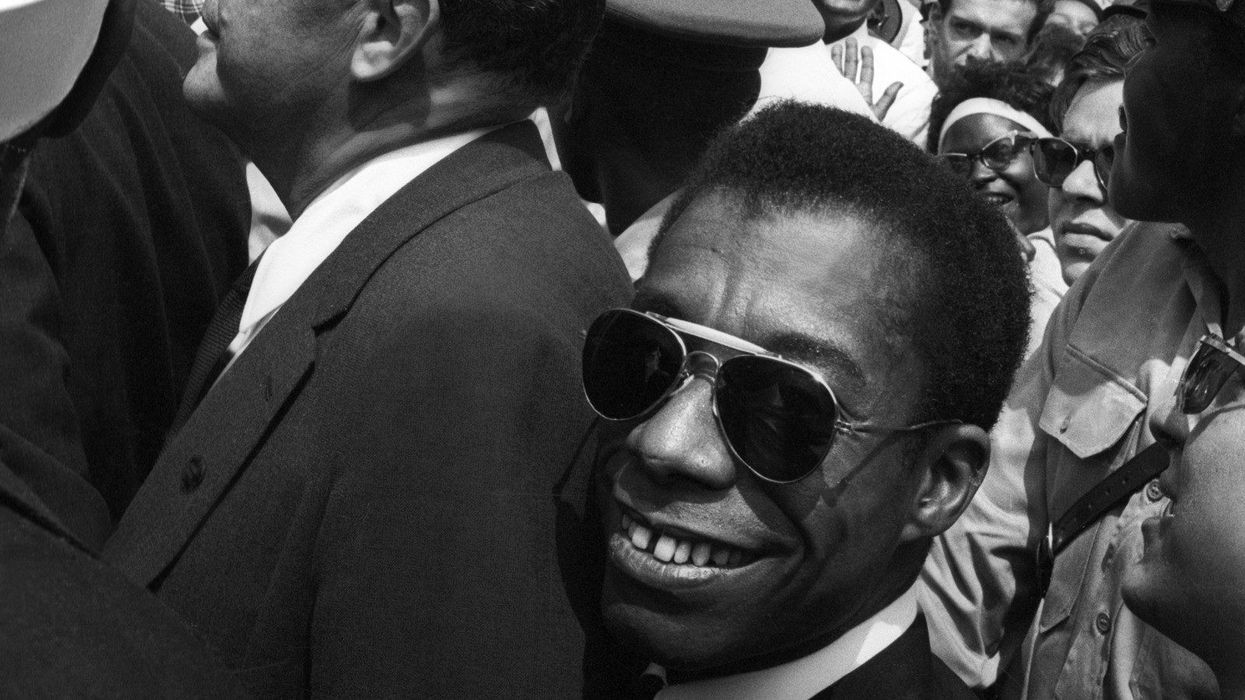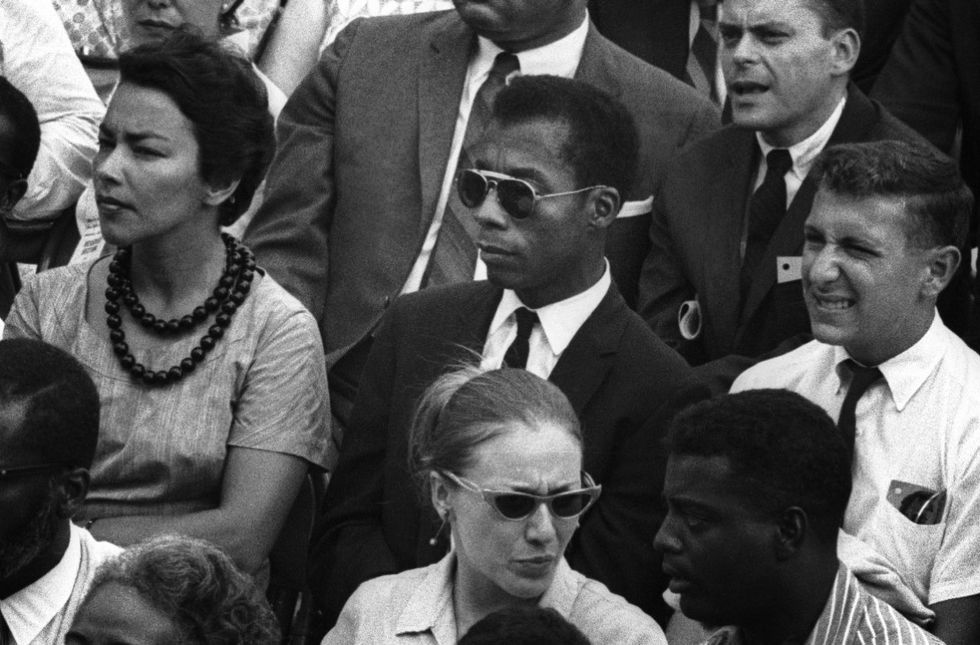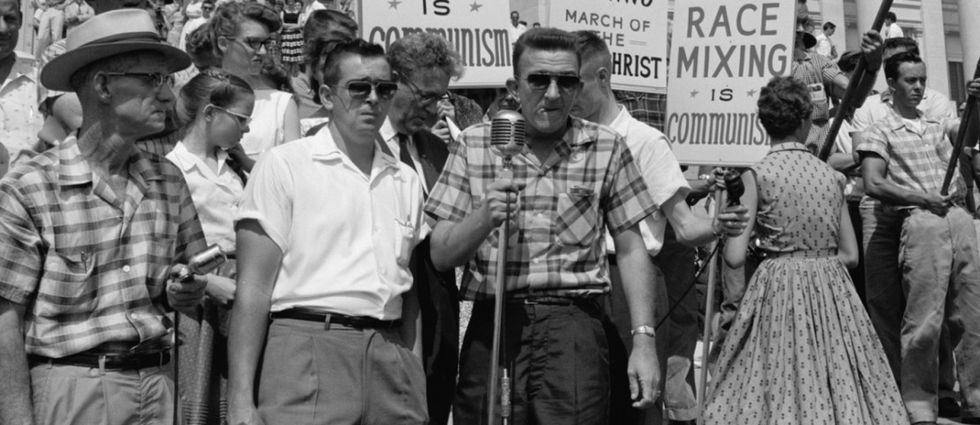'I Am Not Your Negro': Raoul Peck Braved New Forms for His Oscar-Nominated Doc
"I didn't know any existing documentary that had the form I finally used."

Raoul Peck is a name most moviegoers will not likely have heard before last year, though he has made several films. When he isn't making movies like Lumumba (2000), Sometimes in April (2005) or Moloch Tropical (2009), Peck spends his time as an activist. He was born in Haiti and even briefly served as the Haitian Minister of Culture. As one of the last members of the Marxist filmmaker movement, he is a rebel who found his footing by never fully committing to the demands of French financiers, who are typically the only resource available to filmmakers who hail from former colonies.
Now, Peck's name is being spoken by audiences and critics worldwide, thanks to his latest film: the acclaimed and Oscar-nominated I Am Not Your Negro. The film is still selling out theaters in its limited release. That feat is rare for a documentary of any sort, let alone one this angry and radical; It's a fusion of his splendidly furious political engagement and his radical formal ideas.
"How do you reach people? How do you push people to think about who they are?"
I Am Not Your Negro centers on the writings of legendary theorist James Baldwin, specifically his writing on film (found in his landmark book The Devil Finds Work) and the lives of his friends, the murdered activists Malcolm X, Medgar Evers and Martin Luther King, Jr., which he prepared for a book that was never realized. This documentary is that realization, and it's suitably electric. Samuel L. Jackson, giving his best performance, reads Baldwin's words among archival footage of Baldwin and his subjects, and of contemporary New York. No Film School sat down with Peck to discuss approaching a subject so dear to him, and displaying Baldwin to contemporary audiences.
NFS: Can you talk about how you discovered Baldwin, when your relationship to his words began?
Peck: My relationship to James Baldwin started early. He was one of the first authors I could really, totally relate to. Where I did not have to expect any surprise. Arriving to page 56 and then to have thrown back at you that you're black or "a nigger" or whatever. He was one of the first authors I could trust and I felt at home. I never left Baldwin. At every step of my life, I had a Baldwin book with me. And there weren't that many authors like that.
Once you'd read Frantz Fanon, Aimé Césaire, and Baldwin and maybe a few Latin American authors like Alejo Carpentier or García Márquez who came much later...that was it. Your access to the world was reduced to those few authors and everything else, you had to deconstruct.
"It was never meant to be a current film. It was not about 'what do I say today?' But it became that."
NFS: Obviously, you couldn't necessarily predict what the world would look like when the film was released, but did you think that now was an especially good time to bring Baldwin to audiences?
Peck: I started the project ten years ago so it was never meant to be a current film. It was not about "what do I say today?" But it became that. But there was something I felt years ago. I knew there was a battle we could not win anymore. Because of the development of technology, we could not fight all these images which are bombarding us every day. TV, iPad, iPhone...We lost the rhetorical battle. Everything is mixed and sampled in our world.
They always ask you "Yes or no? Black or white? Up or down?" There is no more complexity. It's very hard for someone who tells stories to find a way to keep the fundamentals right and present. It has to be quick now. When they interview you, you have to put everything in a nutshell. I love when journalists ask me, "What is your film in a nutshell?" No! Life is not in a nutshell!
How do you reach people? How do you push people to think about who they are? Where they live? How do you get people to think when everything is quick thanks to the internet and Twitter and Snapchat, etc? Doing this film was all about going back to the fundamentals. Because everything we need to confront the world today is in Baldwin. And I don't just mean if you're black. I'm talking whites and blacks. He put the mirror in front of your face. You can either escape the mirror or you can renounce the mirror but you cannot say you didn't know. This is what Baldwin does to you and I hope this is what the film does.

Peck: When you see a finished film like this, you don't know what the process is. It's not like I had all this in one piece and just had to put it together. It was a long process and I knew it was going to be long because I had no model for the concept I had. I didn't know any existing documentary that had the form I finally used. It was an unknown field and I knew we would need time to find the right way to make this film. To find the right words, the right images, the right music, the right mix.
It's an essay film and at the same time it's a montage film. The only thing I knew starting out was that I was going to make a film totally freely. Without any pressure from the financial side or from the content or the political side. I didn't want to take any prisoners. I wanted to be free with this film and come back to the root of what we do as documentarians. Which is difficult because documentaries tend to be formatted today and they expect people financing them, they expect a market for it and I put this aside. I knew I didn't want any talking heads because it had to be from inside Baldwin's head. It's his words. It's his thinking and it's his way of seeing the world. Once you know all this you have to start making it. The process was long.
"It was a long process and I knew it was going to be long because I had no model for the concept I had."
First I needed the text so I went throughout his books, his letters, his private papers and I took out the story I wanted to tell and of course the main story was about his three friends—Martin Luther King, Medgar Evers and Malcolm X—who were important to him. I had to find in that body of work the book he did not finish. When I got that, I knew how to make that film. The rest was trial and error and, really, editing.
The question was: how do you put words that are powerful to images that have to be powerful? How do you put them together and make a third level that is totally different and sometimes confrontational or contradicting both levels? So that is the game we played throughout the film: How do I bring an audience to the mirror so they can see themselves without being manipulated? This confrontation is what you get most from this film and not in a destructive way. It's a profound confrontation with who you are. Whether you're black or white. But you're confronted with your life in this country, with your ancestor's life. Where you come from. How do you react to what's happening today? To the election. To Donald Trump. All those ideas come towards you and you have to find an answer.
"I knew I didn't want any talking heads because it had to be from inside Baldwin's head. It's his words."
NFS: Baldwin talked about the creation of false people in order to continue to keep systems in place, and it exists in the movie business. These "safe" movies keep getting made for an imaginary audience that studios never get to know. Movies like I Am Not Your Negro don't have this imaginary audience built into them. Studios assume people don't want to see them so they don't take chances on them.
Peck: And that serves ideologically as well. There are people who like conspiracy theories but it's not about that. It's just system we refuse to regulate or have an influence on. There is not one big chief who decides it's going to be like this. It's just our weakness. Every one of us. How we make our choices. How we decide to go left or right. Each time we let go a piece of our independence, our capacity to decide for ourselves, that's how you start down a corridor that's hard to leave. How do you resist that machine, that pressure? You're just tired. It becomes difficult to say no, to accept certain obligations. It's something you have to be aware of every day of your life. Every day of your life you make those choices. Sometimes without acknowledging them, without knowing the consequences, or sometimes you fool yourself. You know deep down it's not the right choice, it's the easy choice. You say "Well I'm intelligent. I'll be able to get away with it." Usually you can't, usually you don't. You pay the price.

Peck: Take a young person who wants to be a filmmaker. He has to pay $50-60,000 to study film. Where is he gonna get the money to pay that back? So if the choice comes: do you want to make Scary Movie when you wanted to make Godard? It's already a choice, and once you've made that choice it's very hard to come back. I've had students at NYU who I knew were incredible filmmakers and they did a comedy and had success, and then they had to make another comedy after that. And I know because they told me they are unhappy with that choice, with their life as filmmakers because that wasn't the film they wanted to do initially but the pressure around them, the money... Unfortunately success is measured is dollars.
"I've had students at NYU who I knew were incredible filmmakers and they did a comedy and had success, and then they had to make another comedy after that."
There are many great filmmakers who are important for me, who I adore. Take someone like Fred Wiseman, probably the most important filmmaker in this country, the most important documentarian. He doesn't have a yacht, he doesn't have two villas in Santa Monica... And his value is not measured with money. That's a perspective, that we lost here. As soon as you enter this business, you feel the power of money, you feel the pressure of money. You see in the eyes of the other: It's not how intelligent you are, how artistically gifted you are, it's more "how much money can I make off of you?" Once you pose the problem in those terms you're bound to lose part of your soul, you're bound to lose part of your skills, and you just work for a machine. I was very lucky to escape those obligations.











